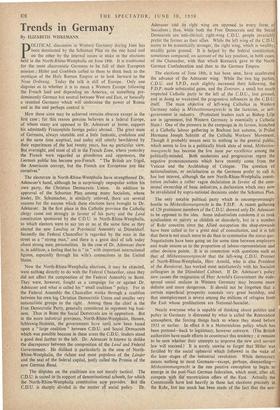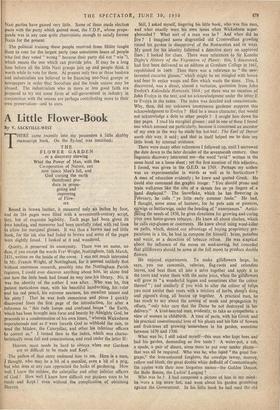Trends in Germany
By ELIZABETH WISKEMANN
pOLITICAL discussion in Western Germany during June has been dominated by the Schuman Plan on the one hand and on the other by the internal issues at stake in the elections held in the North-Rhine-Westphalia on June 18th. It is traditional for the most chauvinistic Germans to be full of their European mission ; Hitler and Goebbels called to them to think back to the mystique of the Holy Roman Empire or to look forward to the Neue Ordnung. Today the talk is still of Europe. Only one disputes as to 'whether it is to mean a Western Europe following the French lead and depending on America, or something pre- dominantly German but neutral between West and East, or basically a reunited Germany which wilt undermine the power of Russia and in the end perhaps control it.
How these aims may be achieved remains obscure except in the first case ; for this reason genuine believers in a federal Europe, of whom many are opposed to Dr. Adenauer at home, support his admittedly Francophile foreign policy abroad. The great mass of Germans, always unstable and a little fantastic, credulous and at the same time sceptical, and today still utterly bewildered by their experiences of the last twenty years, has no particular view. But overnight, and most of all in the French Zone, where yesterday the French were regarded as plunderers and oppressors, the German public has become pro-French. " The British are frigid, the Americans corrupt, but the French are Europeans just like ourselves."
The electorate in North-Rhine-Westphalia have strengthened Dr. Adenauer's hand, although he is surprisingly unpopular within his
own party, the Christian Democratic Union. In addition to approval of the Schuman Plan among many Socialists, whose leader, Dr. Schumacher, is similarly unloved, there are several reasons for the success which these elections have brought to Dr. Adenauer. In the first place in this Catholic province the Catholic clergy came out strongly in favour of his party and the Land constitution sponsored by the C.D.U. in North-Rhine-Westphalia, to which electors were to say yes or no at the same time as they elected the new Landtag or Provincial Assembly at Dusseldorf. Secondly the Federal Chancellor is regarded by the man in the street as a " strong man," and there is a great deal of talk today about strong men, personalities. In the case of Dr. Adenauer there is, in addition, a feeling that he is " in " with important international figures, especially through his wife's connections in the United States.
Now the North-Rhine-Westphalia elections, it may be objected, were nothing directly to do with the Federal Chancellor, since they did not affect the composition of the Federal Assembly in Bonn. They were, however, fought as a campaign for or against Dr. Adenauer and what is called his " small coalition " policy. For in the Federal Assembly the Chancellor works through a coalition between his own big Christian Democratic Union and smaller very nationalistic groups to the right. Among these the chief is the Free Democratic Party, generally considered to represent big busi- ness. Thus in Bonn the Social Democrats are in opposition. But in the more industrial provinces, North-Rhine-Westphalia, Hessen, Schleswig-Holstein, the governments have until now been based upon a " large coalition " between C.D.U. and Social Democrats which was possible because in these areas the C.D.U. leaders stand a good deal farther to the left. Dr. Adenauer is known to dislike the discrepancy between the composition of the Land and Federal Governments. He disliked it particularly in the case of North- Rhine-Westphalia, the richest and most populous of the Lander and the seat of the federal capital, justly called the Prussia of the new German Bund.
The disputes on the coalitions are not merely tactical. The C.D.U. is united in its support of denominational schools, for which the North-Rhine-Westphalia constitution now provides. But the C.D.U. is sharply divided in the matter of social policy. Dr. Adenauer and its right wing are opposed to every form of Socialism ; thus, while both the Free Democrats and the Social Democrats are anti-clerical, right-wing C.D.U. people invariably prefer the former as their allies. While the left wing of the C.D.U. seems to be numerically stronger, the right wing, which is wealthy, steadily gains ground. It is helped by the federal constitution, sometimes compared, on account of the key position, in both cases, of the Chancellor, with that which Bismarck gave to the North German Confederation and then to the German Empire.
The elections of June 18th, it has- been seen, have accelerated the advance of the Adenauer wing. While the two big parties, C.D.U. and S.P.D., each slightly increased their following, the F.D.P. made substantial gains, and the Zentrum, a small but much respected Catholic party to the left of the C.D.U., lost ground, and in doing so weakened the progressive influences in the C.D.U. itself. The main objective of left-wing Catholics in Western Germany today is Mitbestimmungsrecht in the factories, or self- government in industry. (Protestant leaders such as Bishop Lilje are in agreement, but Western Germany is essentially a Catholic State.) One of the pioneers in the campaign in its favour, launched at a Catholic labour gathering in Bochum last autumn, is Priilat Hermann Joseph Schmitt of the Catholic Workers' Movement. Though it probably means next to nothing to the general public, which seems to live in a politically blank state of mind, Mitbestim- mungsrecht has become the live issue par excellence among the politically-minded. Both moderates and progressives regret the negative pronouncements which have recently come from the Vatican and the Archbishop of Cologne. The question of nationalisation, or socialisation as the Germans prefer to call it, has lost interest, although the new North-Rhine-Westphalia consti- tution includes a rather vague declaration in favour of the com- munal ownership of basic industries, a declaration which may now be invalidated by supra-national decisions under the Schuman Plan.
The only notable political party which is uncompromisingly hostile to Mitbestimmungsrecht is the F.D.P. A recent gathering of 129 prominent members of the C.D.U. showed only Dr. Adenauer to be opposed to the idea. Some industrialists condemn it as rank syndicalism or merely as childish or disorderly, but in a number of Ruhr concerns since the Allied occupation the shop-stewards have been called in for a great deal of consultation, and it is felt that there is not much more to do than to systematise the status quo. Negotiations have been going on for some time between employers and trade unions as to the proportion of labour-representation and other decisive points. It is in connection with questions such as that of Mitbestimmungsrecht that the left-wing C.D.U. Premier of North-Rhine-Westphalia, Herr Arnold, who is also President of the Bundesrat, has worked most satisfactorily with his Socialist colleagues in the Dusseldorf Cabinet. if Dr. Adenauer's policy now, causes the resignation of Herr Arnold's Government the wide- spread social malaise in Western Germany may become more definite and more dangerous. It should not be forgotten that a certain superficial prosperity conceals very great hardship; and that unemployment is severe among the millions of refugees from the East whose predilections are National-Socialist.
Nearly everyone who is capable of thinking about politics and policy in Germany is distressed by what is called the Restoration atmosphere, the forcing things back to where they stood before 1933 or earlier. In effect it is a Metternichian policy which has been pursued—back to legitimacy, however outworn. (The British authorities have-made efforts to counteract this tendency ; it remains to be• seen whether their attempts to improve the new civil service law will succeed.) It is surely unwise to forget that Hitler was fortified by the social upheaval which followed in the wake of the later stages of the industrial revolution. While democracy means nothing to most Germans—except, perhaps, dismantling- Mitbestimmungsrecht is the one positive conception to begin to emerge in the post-Nazi German federation, which must, after all, compete with the meretricious offers of the East. Actually the Communists have lost heavily in these last elections precisely in the Ruhr, but too much has been made of the fact that the neo-
Nazi parties have gained very little. Some of them made election pacts with the party which gained most, the F.D.P., whose propa- ganda was in any case quite chauvinistic enough to satisfy former Nazis for the present.
The political training 'these people received from Hitler taught them to vote for the largest party (one sometimes hears of people who feel they voted " wrong " because their party did not " win "), which means the one which can provide jobs, It' may be a long time before all the little Nazi groups join up and people think it worth while to vote for them. At present only two or three bankers and industrialists are believed to be financing neo-Nazi groups or newspapers in order that Socialism and the trade unions may be abused. The industrialists who in more or less good faith are prepared to try out some form of self-government in industry in conjunction with the unions are perhaps contributing more to their own preservation—and to ours.















































 Previous page
Previous page